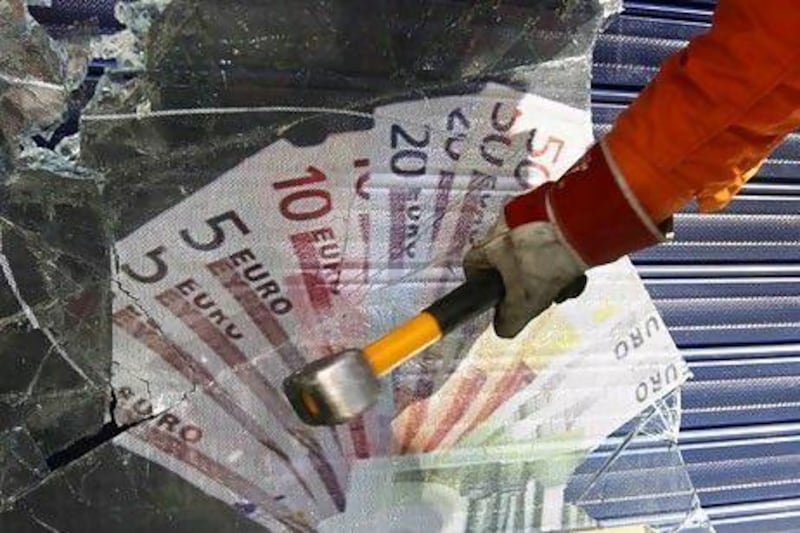Dark clouds are gathering in the currency markets, raising fears of greater troubles ahead for the already crippled global economy.
HSBC's Global Hazard Indicator, which matches signs of volatility in trading of the US dollar, euro and yen, shows wide variations in prices over the next year.
Analysts say the reading signals a bumpy ride in the coming year for currency investors as dramas unfold in the the United States and the euro zone.
"There's a great deal of uncertainty and this is reflected in currency markets," said Giyas Gokkent, the chief economist of National Bank of Abu Dhabi.
Swings in the euro this year have been closely linked to the fiscal drama playing out in the euro zone. The currency slid to a two-month low of US$1.2661 on Tuesday after the release of a gloomy German economic sentiment survey.
"This whole year the sole concentration of the market has been on the euro and we will start focusing more on the dollar," David Bloom, the head of foreign exchange strategy at HSBC said last week.
He sees the next big tests for markets as talks over the US fiscal budget and whether Spain steps up to take a bailout from the European Stability Mechanism (ESM), the €500 billion (Dh2.33 trillion) new aid fund.
"When Spain comes to the ESM … the default risk in Europe shrinks a little more and the fiscal cliff is a little bit damaging for the dollar," he said.
The fiscal cliff relates to US$600 billion (Dh2.2tn) of budget cuts and tax increases which would come into force at the end of the year if policymakers fail to agree on deficit reductions.
In the euro zone, focus is on whether a possible bailout for Spain and fresh funds for Greece can help to ease the currency area's woes.
Strengthening US jobs data and rising consumer confidence have helped to support the dollar in recent months.
But HSBC expects the dollar's fortunes to reverse as the fiscal cliff takes centre stage.
Escalating worries about the country's mounting economic woes would erode investor appetite for dollar holdings, it says. The euro will rise to $1.40 by the end of next year, it anticipates.
A weakening dollar carries potential risks for the GCC, where five of the six states have currency pegs to the greenback. A lower dollar can push up the cost of importing food and other goods.
But other analysts disagree about the outlook. Max Knudsen, the chief market strategist at ADS Securities in Abu Dhabi, believes an avoidance of the fiscal cliff had been "priced into" the currency market.
"The euro will continue to deteriorate over the dollar," he said. "We are in the process of unwinding a rally in the euro that had built up based on comments by Mario Draghi [European Central Bank president] in July about buying sovereign bonds."
But if the US economy did drop off the fiscal cliff this could also send ripples through markets.
"The fiscal cliff would be dollar-positive as it means there will be spending cuts and tax increases which would improve US fiscal balances," said Mr Gokkent. "Even if the US was pushed into recession it would be good for asset classes that cater for risk aversion, like US treasuries."
Uncertainties elsewhere in the global economy are also dictating the direction of other currencies. The Japanese yen dropped sharply yesterday after the prime minister Yoshihiko Noda said he was open to dissolving the lower house of parliament this week and holding elections next month. Early elections are considered a negative for the currency as the main opposition Liberal Democratic Party is regarded as the most likely winner. It is expected to put pressure on the Bank of Japan to further ease monetary policy, dragging on the yen.
Uncertainty about the outlook for the major currencies has prompted a pull-back in foreign exchange speculation.
Average daily volume in foreign exchange through Icap's EBS trading system slumped by 46 per cent last month from a year earlier, the company said last week.
Moves by other countries to more closely control their currencies have also limited the ability to make money through carry trade. In response to a rush of capital into emerging markets, governments from Turkey to Brazil have taken action to stabilise their currencies and move away from free floats.





